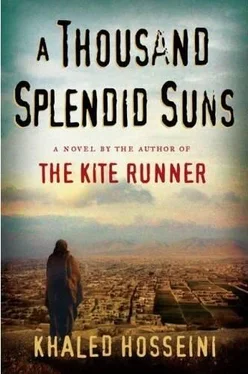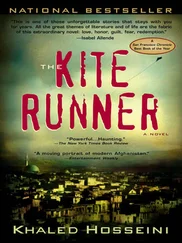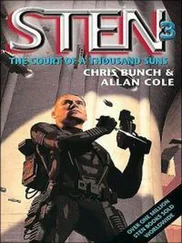Now, if you don't mind, I'm trying to listen."
He turned up the volume again, leaned his head back and closed his eyes.
One sunny morning that week, Mariam picked a spot in the yard and dug a hole.
"In the name of Allah and with Allah, and in the name of the messenger of Allah upon whom be the blessings and peace of Allah," she said under her breath as her shovel bit into the ground. She placed the suede coat that Rasheed had bought for the baby in the hole and shoveled dirt over it.
"You make the night to pass into the day and You make the day to pass into the night, and You bring forth the living from the dead and You bring forth the dead from the living, and You give sustenance to whom You please without measure."
She patted the dirt with the back of the shovel. She squatted by the mound, closed her eyes.
Give sustenance, Allah.
Give sustenance to me.
April 1978
On April 17, 1978, the year Mariam turned nineteen, a man named Mir Akbar Khyber was found murdered. Two days later, there was a large demonstration in Kabul. Everyone in the neighborhood was in the streets talking about it. Through the window, Mariam saw neighbors milling about, chatting excitedly, transistor radios pressed to their ears. She saw Fariba leaning against the wall of her house, talking with a woman who was new to Deh-Mazang. Fariba was smiling, and her palms were pressed against the swell of her pregnant belly. The other woman, whose name escaped Mariam, looked older than Fariba, and her hair had an odd purple tint to it. She was holding a little boy's hand. Mariam knew the boy's name was Tariq, because she had heard this woman on the street call after him by that name.
Mariam and Rasheed didn't join the neighbors. They listened in on the radio as some ten thousand people poured into the streets and marched up and down Kabul 's government district. Rasheed said that Mir Akbar Khyber had been a prominent communist, and that his supporters were blaming the murder on President Daoud Khan's government. He didn't look at her when he said this. These days, he never did anymore, and Mariam wasn't ever sure if she was being spoken to.
"What's a communist?" she asked.
Rasheed snorted, and raised both eyebrows. "You don't know what a communist is? Such a simple thing.
Everyone knows. It's common knowledge. You don't… Bah. I don't know why I'm surprised." Then he crossed his ankles on the table and mumbled that it was someone who believed in Karl Marxist.
"Who's Karl Marxist?"
Rasheed sighed.
On the radio, a woman's voice was saying that Taraki, the leader of the Khalq branch of the PDPA, the Afghan communist party, was in the streets giving rousing speeches to demonstrators.
"What I meant was, what do they want?" Mariam asked. "These communists, what is it that they believe?"
Rasheed chortled and shook his head, but Mariam thought she saw uncertainty in the way he crossed his arms, the way his eyes shifted. "You know nothing, do you? You're like a child. Your brain is empty. There is no information in it."
"I ask because-"
"Chup ko. Shut up."
Mariam did.
It wasn't easy tolerating him talking this way to her, to bear his scorn, his ridicule, his insults, his walking past her like she was nothing but a house cat. But after four years of marriage, Mariam saw clearly how much a woman could tolerate when she was afraid. And Mariam was afraid She lived in fear of his shifting moods, his volatile temperament, his insistence on steering even mundane exchanges down a confrontational path that, on occasion, he would resolve with punches, slaps, kicks, and sometimes try to make amends for with polluted apologies and sometimes not.
In the four years since the day at the bathhouse, there had been six more cycles of hopes raised then dashed, each loss, each collapse, each trip to the doctor more crushing for Mariam than the last. With each disappointment, Rasheed had grown more remote and resentful. Now nothing she did pleased him. She cleaned the house, made sure he always had a supply of clean shirts, cooked him his favorite dishes. Once, disastrously, she even bought makeup and put it on for him. But when he came home, he took one look at her and winced with such distaste that she rushed to the bathroom and washed it all off, tears of shame mixing with soapy water, rouge, and mascara.
Now Mariam dreaded the sound of him coming home in the evening. The key rattling, the creak of the door – these were sounds that set her heart racing. From her bed, she listened to the click-clack of his heels, to the muffled shuffling of his feet after he'd shed his shoes. With her ears, she took inventory of his doings: chair legs dragged across the floor, the plaintive squeak of the cane seat when he sat, the clinking of spoon against plate, the flutter of newspaper pages flipped, the slurping of water. And as her heart pounded, her mind wondered what excuse he would use that night to pounce on her. There was always something, some minor thing that would infuriate him, because no matter what she did to please him, no matter how thoroughly she submitted to his wants and demands, it wasn't enough. She could not give him his son back. In this most essential way, she had failed him – seven times she had failed him – and now she was nothing but a burden to him. She could see it in the way he looked at her, when he looked at her. She was a burden to him.
"What's going to happen?" she asked him now.
Rasheed shot her a sidelong glance. He made a sound between a sigh and a groan, dropped his legs from the table, and turned off the radio. He took it upstairs to his room. He closed the door.
ON APRIL 27, Mariam's question was answered with crackling sounds and intense, sudden roars. She ran barefoot down to the living room and found Rasheed already by the window, in his undershirt, his hair disheveled, palms pressed to the glass. Mariam made her way to the window next to him. Overhead, she could see military planes zooming past, heading north and east. Their deafening shrieks hurt her ears. In the distance, loud booms resonated and sudden plumes of smoke rose to the sky.
"What's going on, Rasheed?" she said. "What is all this?"
"God knows," he muttered. He tried the radio and got only static.
"What do we do?"
Impatiently, Rasheed said, "We wait."
LATER IN THE DAY, Rasheed was still trying the radio as Mariam made rice with spinach sauce in the kitchen. Mariam remembered a time when she had enjoyed, even looked forward to, cooking for Rasheed. Now cooking was an exercise in heightened anxiety. The qurmas were always too salty or too bland for his taste. The rice was judged either too greasy or too dry, the bread declared too doughy or too crispy. Rasheed's faultfinding left her stricken in the kitchen with self-doubt.
When she brought him his plate, the national anthem was playing on the radio.
"I made sabzi, " she said.
"Put it down and be quiet."
After the music faded, a man's voice came on the radio. He announced himself as Air Force Colonel Abdul Qader. He reported that earlier in the day the rebel Fourth Armored Division had seized the airport and key intersections in the city. Kabul Radio, the ministries of Communication and the Interior, and the Foreign Ministry building had also been captured. Kabul was in the hands of the people now, he said proudly. Rebel MiGs had attacked the Presidential Palace. Tanks had broken into the premises, and a fierce battle was under way there. Daoud's loyalist forces were all but defeated, Abdul Qader said in a reassuring tone.
Days later, when the communists began the summary executions of those connected with Daoud Khan's regime, when rumors began floating about Kabul of eyes gouged and genitals electrocuted in the Pol-e-Charkhi Prison, Mariam would hear of the slaughter that had taken place at the Presidential Palace. Daoud Khan had been killed, but not before the communist rebels had killed some twenty members of his family, including women and grandchildren. There would be rumors that he had taken his own life, that he'd been gunned down in the heat of battle; rumors that he'd been saved for last, made to watch the massacre of his family, then shot.
Читать дальше












